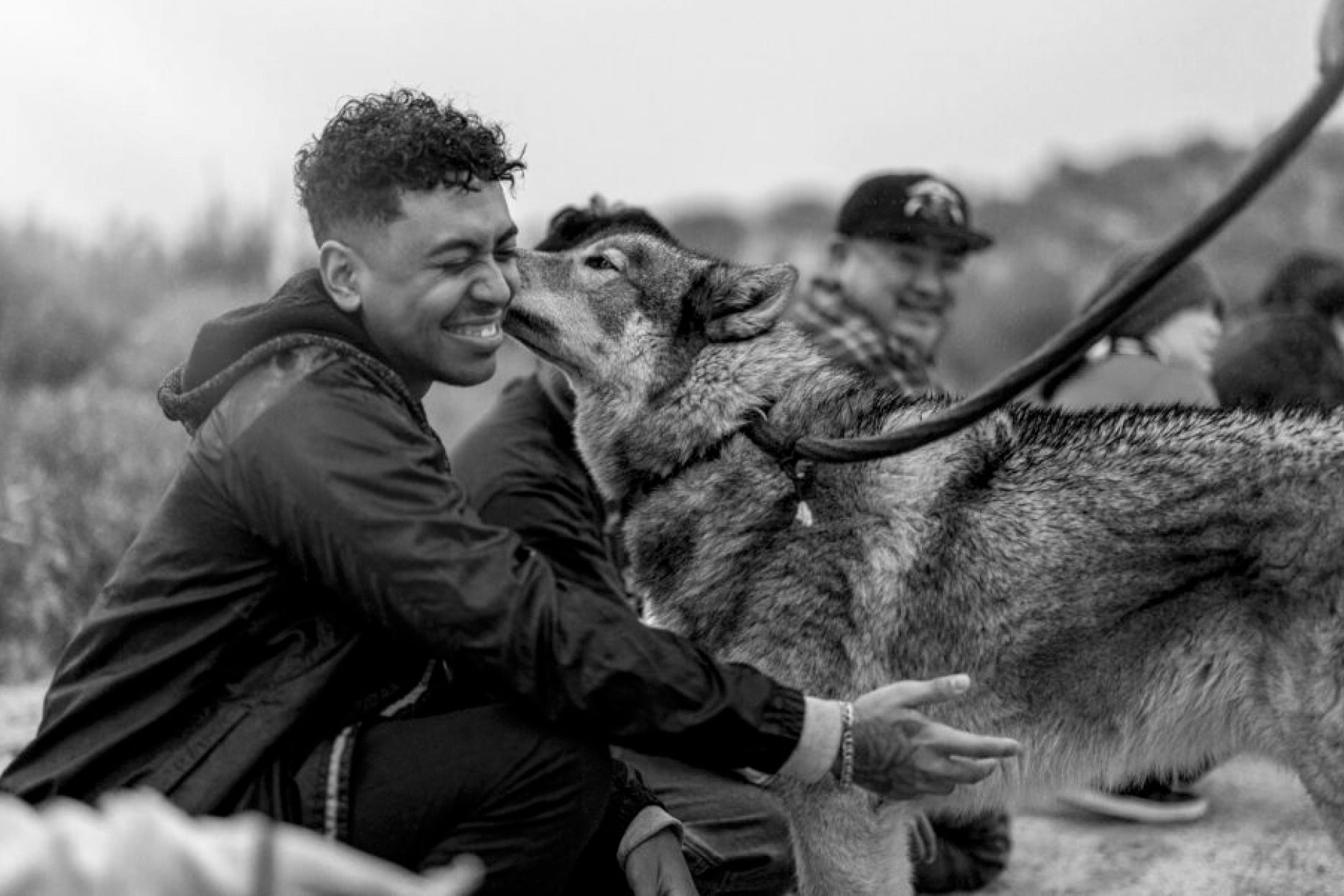
In the high desert city of Acton, north of Los Angeles, where the San Gabriel Mountains meet the Sierra Pelona, a small sanctuary called Wolf Connection has been quietly redefining what it means to connect with the wild.
In the high desert city of Acton, north of Los Angeles, where the San Gabriel Mountains meet the Sierra Pelona, a small sanctuary called Wolf Connection has been quietly redefining what it means to connect with the wild.
Founded in 2009 by author Teo Alfero, the nonprofit began as a refuge for rescued wolves and wolfdogs, animals that are often misunderstood, abandoned, and/or displaced. But, after Alfero saw the impact the rescued wolf dogs had on young people, the nonprofit evolved into something more profound: a bridge between species, a place where trauma, community, and transformation converge. Through guided hikes, youth programs, and immersive retreats, Wolf Connection uses its resident pack to teach lessons in leadership, empathy, and balance. A model that reminds us that healing, like nature, is relational.
When the pandemic shuttered in-person programs in 2020, John Calfa III, a long-time volunteer and media professional, found himself asking how the organization’s message might continue to reach people beyond its gates. The answer became The Wolf Connection Podcast, co-hosted with colleague Stephen Rivera—a weekly series exploring the intersection of wolves, science, spirituality, and storytelling. What began as a small quarantine experiment has since grown into an archive of over 250 episodes, featuring biologists, tribal elders, writers, ecologists, and ordinary people whose lives have been reshaped by the presence—or absence—of wolves.
“The podcast was never meant to be about us,” Calfa reflects. “It was about giving others a voice.” That guiding principle has shaped the show’s ethos as much as its audience. For Calfa, who works directly with the sanctuary’s wolves several times a week, the lessons run deeper than metaphor. “You learn quickly that connection isn’t dominance—it’s partnership,” he says. “The wolves mirror you back to yourself.”
Now entering its sixth year, The Wolf Connection Podcast has become more than an extension of a nonprofit—it’s a living archive of perspectives, bridging science and spirit, ranchers and researchers, the human and the wild.
JMM: The podcast began during the pandemic, when Wolf Connection couldn’t host visitors onsite. How did that idea first take shape?
John Calfa: It really started in 2020, when everything stopped. No visitors, no school groups, no programs—it was quiet. A few of us began wondering how we could still share the message of Wolf Connection without that physical interaction. Stephen Rivera and I were already listening to a lot of podcasts, and one day we just said, “Why don’t we do this ourselves?” We brought the idea to Teo, the founder of Wolf Connection, and he immediately said, “Go for it.” That freedom, to create something authentic without knowing if it would succeed, was a gift. We didn’t just want to talk about wolves. We wanted to share human stories: the people behind the sanctuary, the guests whose lives had been changed by being here.
JMM: Who was your first guest?
Calfa: Teo, of course. I was nervous, out of my mind. But it was the perfect beginning—talking with the person who built the foundation for everything we do. Over time, I found my rhythm. The more conversations we had, the more I realized the show wasn’t just about wolves, it was about how we relate to them, and what that reveals about ourselves.
JMM: After more than 250 episodes, how has your understanding of that human–wolf bond evolved?
Calfa: It’s deepened. Working at the sanctuary and hosting the show simultaneously means I’m living what we talk about. The bond isn’t just symbolic—it’s instinctual, ancient. Wolves remind us that partnership doesn’t mean control. It’s 50/50. It’s about presence, awareness, and respect. I even see it reflected in how I relate to my own dogs—less about dominance, more about communication and trust.
JMM: Wolves have carried symbolic weight for centuries—villain, hero, teacher, spirit guide. How do you think about that now?
Calfa: I’ve never seen another species hold so many opposing roles. Wolves are feared and worshiped, vilified and romanticized. But in truth, they’re just trying to live, feed their families, and survive. When you’re around them long enough, you realize how much they mirror you. If I’m distracted or ungrounded, the wolves sense it immediately, and they reflect that energy right back. It’s humbling. They teach you to show up fully or not at all.
JMM: The podcast has featured scientists, ranchers, conservationists, spiritual teachers—a wide range of voices. What have you learned about building bridges between those worlds?
Calfa: Listening. It’s underrated, but it changes everything. Everyone—human, animal, plant—just wants to be heard. From the beginning, our goal was to create a space where different perspectives could coexist. We call it “the radical middle.” It shouldn’t be radical to meet there, but it often is. Whether we’re talking with a Yellowstone biologist or a rancher living alongside wolves, it starts with the same thing: invitation. The mic is open, the chair is open. Let’s talk.
JMM: What lessons have the wolves taught you personally?
Calfa: To simplify. Wolves don’t overthink, they act with clarity. They remind you to lead with instinct, to trust timing, to commit fully. We call it “sacred timing” at the sanctuary—the understanding that growth happens when it’s meant to. You can’t rush it, but you can show up ready.
JMM: Looking ahead, where do you see The Wolf Connection Podcast going next?
Calfa: Wolves will always be our anchor, but they’re also a gateway to a much larger conversation. We want to explore the entire web of life—biodiversity, ecology, the wisdom of other species. Wolves opened the door, now it’s about everything connected to them: soil, trees, water, air. We’ve lost so much of that awareness. If we can help people rediscover even a small piece of it, that’s the work. That’s the calling.
WRITTEN BY Jennifer Sherry and Andrew Pogany
#Stewardship